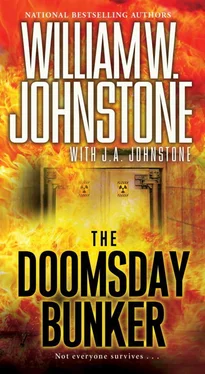“Are you willing to bet your life on that?” Fisher asked with a scowl.
Unfortunately, Larkin wasn’t ready to bet his life on that assessment. Even more important, he wasn’t willing to risk his daughter’s life.
“We’d better tread lightly here, Chuck,” he said. “If anybody sets off fireworks, we don’t want it to be us.”
“I won’t have them strutting around here flouting the rules,” Fisher said. He started forward, his long strides carrying him quickly toward the large group in the center of the bunker.
The crowd parted to let Charlotte Ruskin and her companions through, but as people looked around and saw Fisher, Larkin, Jill, and Threadgill approaching, they moved closer together and got truculent looks on their faces, as if they meant to block the security force’s advance.
“Step aside,” Fisher ordered.
“This isn’t any of your business,” one of the men responded.
“Everything that happens in this project is my business. I’m the head of security.”
“There’s no trouble here,” a woman said. “You’re not needed.”
“That’s right,” another man put in. “This is a peaceful assembly. We’ve got a right to that, don’t we?”
“Don’t talk to me about—” Fisher stopped and took a deep breath. Larkin figured he’d been on the verge of saying not to talk to him about rights, but then Fisher had thought better of it. As Larkin had pointed out, it was a fine line they had to walk.
Instead, Fisher went on, “Those men are armed. That’s a violation of the rules.”
“What about the Second Amendment?”
That was another tricky area. Decades of efforts by liberal politicians to circumvent or abolish the right of American citizens to bear arms had failed for the most part, probably because those politicans knew in their guts that if they pushed the issue too hard, more than likely it would result in a civil war—and rightly so, in Larkin’s opinion.
However, that was all moot now. Or was it? Moultrie had made it plain that he wanted the Hercules Project to perpetuate American traditions and standards as much as possible, and the right to bear arms was part of that. Regulating that right because of the special circumstances was understandable, but Larkin had always worried about the slippery-slope aspect of that. Now this direct confrontation over the matter made him uneasy.
Charlotte Ruskin’s voice came from behind the human wall, saying, “Step aside, please. I’ll talk to them.”
“You don’t have to do that, Charlotte,” a man told her as he turned to look at her. “We’re not afraid of them.”
“No, it’s better to get things out in the open,” Ruskin insisted. She moved forward, and the people blocking her path stepped out of the way.
“What is it you’re doing here?” Chuck Fisher demanded when he was face-to-face with the woman. “And why are those men carrying shotguns?”
“Self-defense,” Ruskin coolly answered the second question first. “We have a right to protect ourselves.”
“Nobody’s going to hurt you as long as you’re not breaking the rules.”
The woman smiled. “Americans have a long tradition of breaking the rules. It’s how the whole country got started, remember?”
“This is different—” Fisher began.
“Is it?” Ruskin broke in sharply. “How is it different, Chuck? We’re tired of the rule of an overbearing, despotic tyrant.”
Fisher started breathing a little harder. “How the hell can you say that? None of you people would even be alive today if it weren’t for Graham Moultrie!”
“That’s true,” Ruskin admitted. “But that doesn’t give him the right to dictate every aspect of our lives.”
“Seems to me it does, because he knows more about how this place works than anybody else. And if it doesn’t keep working perfectly, that means all of us will probably die.”
Ruskin shook her head, blew out a dismissive breath, and said, “You can’t possibly know that.”
“I don’t plan on taking a chance of being wrong. Anyway, you don’t really care about anybody’s rights. The only reason you’re doing this is because you’re mad at Graham for closing up the project before your husband got here.”
Ruskin’s nostrils flared as she sharply drew in air. Her face paled. Jeff Greer had moved up behind her, and he started to crowd forward, his hands tight on the shotgun he carried, as he said, “You’d better shut your damn mouth, you—”
Fisher took a step closer, too, and said, “What were you about to call me?”
“Stop it, both of you!” Charlotte Ruskin said. It didn’t look like her words were going to do much good, though, because Fisher and Greer both had their chests stuck out like bull apes ready to do battle.
“Charlotte, what is it you want?” Larkin asked, hoping to steer the conversation back on point and away from violence. “What do you hope to accomplish with this meeting?”
Ruskin glanced back and forth between Fisher and Greer, who were still glaring at each other, and then said, “We want to establish some reasonable reforms.”
“Like what?”
“Like giving people a voice in the decisions that are made down here, rather than Moultrie just handing down orders.”
“So basically you just want to express your opinion.”
“I’d like to see somebody else in charge,” Ruskin said, “but for right now I’d settle for being listened to and taken seriously.”
“Yelling and waving guns around isn’t the way to do that,” Larkin said.
“The hell it’s not,” Greer snapped. “Nobody ever really pays attention unless they feel like they’re being threatened.”
“I don’t think that’s true. Have you tried writing letters, circulating petitions—”
Greer snorted in contempt. “When did that ever work in the past? Don’t you know anything about history, Larkin? When did anything ever really change except by force?”
He had a good point there, Larkin thought. There had been some nonviolent turning points in history—but not many.
On the other hand, there had never been a closed system like the Hercules Project before. One could argue that ships at sea were similar, especially back in the age of sail, when there was no long-range communication. Each of those ships had been under the command of a single captain whose word was law, much like Moultrie’s was here.
And from time to time, the threat of mutiny had arisen on those ships, too, and sometimes it ended in bloody slaughter. Not the most appealing precedent, Larkin thought.
The tension in the air was growing tighter and thicker. Larkin glanced at Jill and Threadgill. Both of them looked as worried as he felt. They would do their duty as members of the security force, but he could tell they were conflicted, too, about who was right and wrong in this confrontation.
With Fisher and Greer both seemingly eager for trouble, there was no telling what might have happened… but at that moment the dynamic changed again. A surprised stir went through the crowd, and since most of them were staring past Larkin and his companions, he half-turned to look over his shoulder.
Graham Moultrie was walking briskly toward them. He stopped about twenty feet away, stuck his hands in the pockets of his jeans, and asked, “What’s going on here?”
For a moment, Charlotte Ruskin gazed at Moultrie as if unable to believe what she was seeing. Then she took a step forward. Since Fisher and Greer were still caught up in their own confrontation, Larkin moved a little to the side so he could intercept Ruskin if she tried to attack Moultrie.
“It’s all right, Patrick,” Moultrie said. “Mrs. Ruskin is a reasonable woman.”
Читать дальше









